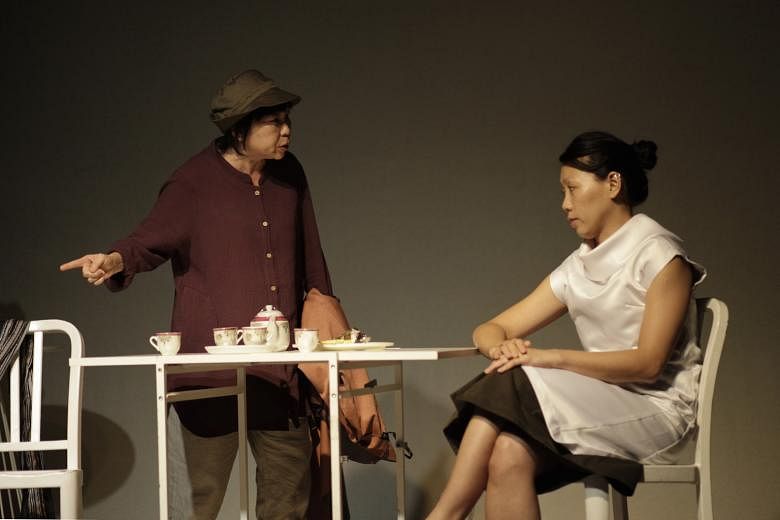Actors in the upcoming play Manifesto will explore Singapore's linguistic and cultural diversity, as its characters code-switch between English, Mandarin, Malay and the various Chinese dialects.
The production is a rare collaboration between two theatre groups here, The Necessary Stage and Drama Box. It features a seven-man cast with actors of different ethnicities, from veterans such as Sani Hussin to younger performers such as Ellison Tan and Sharda Harrison.
Its plot unfolds across 70 years, from the 1950s to 2020s, and traces the lives of artists in four epochs as they hone their craft in a tumul- tuous and hostile environment.
Manifesto's co-directors, Alvin Tan of The Necessary Stage and Kok Heng Leun of Drama Box, say that the choice to use multiple languages was challenging, but necessary to "reflect Singapore's diversity" at the time.
Says actress Goh Guat Kian, who plays multiple characters across two eras: "Code-switching doesn't come so easily, especially when you switch from Malay to, say, Hokkien and then to English. I had to scrutinise my lines."
-
BOOK IT / MANIFESTO
-
WHERE: The Necessary Stage Black Box, 278 Marine Parade Road
WHEN: March 9 to 20; Wednesday to Saturday, 8pm; weekend, 3pm; no shows on Monday and Tuesday
ADMISSION: $35 from Sistic (call 6348-5555 or go to www.sistic.com.sg)
INFO: Go to www.necessary.org
Kok says: "Even translating the script was difficult, when you think about the different structure and syntax of each language."
While Tan and Kok head their respective companies, the pair have worked together previously. Kok worked at The Necessary Stage before leaving to join Drama Box in 1999. He has directed plays written by Haresh Sharma, including Hope (1994) and October (1996).
They have a comfortable rapport, feeding off each other's energy. Says Kok: "Perhaps people wonder, can two companies with different visions come together? But I don't think we're radically different."
Tan adds: "We see any differences as a sparring opportunity. We see this project as a kind of cauldron in which you put the ingredients of two companies that have grown separately and see what comes out."
The production includes multi- disciplinary artist Loo Zihan and sound artist Bani Haykal, who are using multimedia and soundscapes to shape the experience of the play.
During the play's devising process, Loo asked cast members to use their mobile devices to film certain exchanges.
"They would come up with scenarios where they have to communicate with other characters on FaceTime. So we look at why they would mediate it over the phone, how the phone lets you perform, how multimedia and technology mediate relationships and expand possibilities of what the theatre space can do."
Manifesto also explores issues such as historicisation and how the state-artist relationship has evolved through the years.
Playwright Sharma says Manifesto has been in the works since 2013 and is not a result from a recent debate over funding and censorship between the National Arts Council and members of the arts community.
He says: "The stories are fictional, but the research was based on facts. As artists living in the present, we go through those struggles too, as sometimes you create controversial works."
But the importance, he stresses, is to stage the play in a way that it does not devolve into "navel- gazing". He adds: "We're not ashamed of writing about artists, but we're aware that we're writing for a non-artist audience."
Says Kok: "Manifesto is about its characters finding their place in the world, by projecting into the future… you compose your own life based on what happened in the past, what's happening in the future."
Adds Tan: "It encourages everyone to compose their own life like they compose art. The artist and the everyday are not separate. We're all artists."
Correction note: An earlier version of the story stated that Kok Heng Leun left The Necessary Stage in 1990. It should be 1999. We are sorry for the error.


